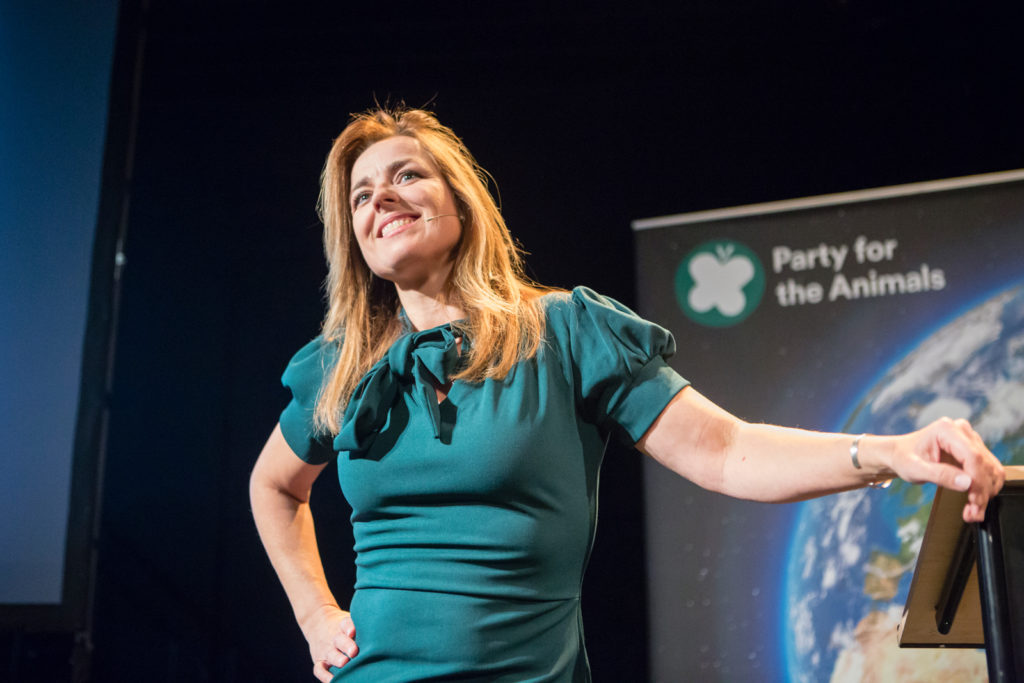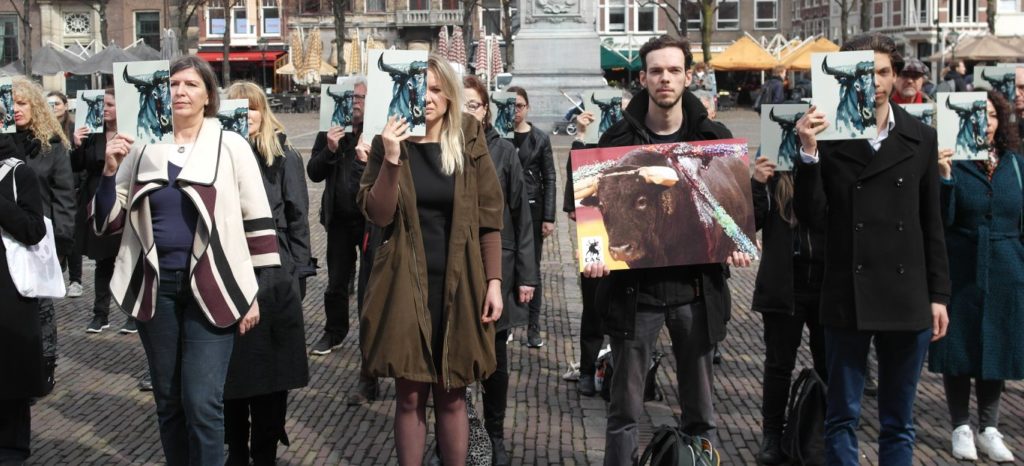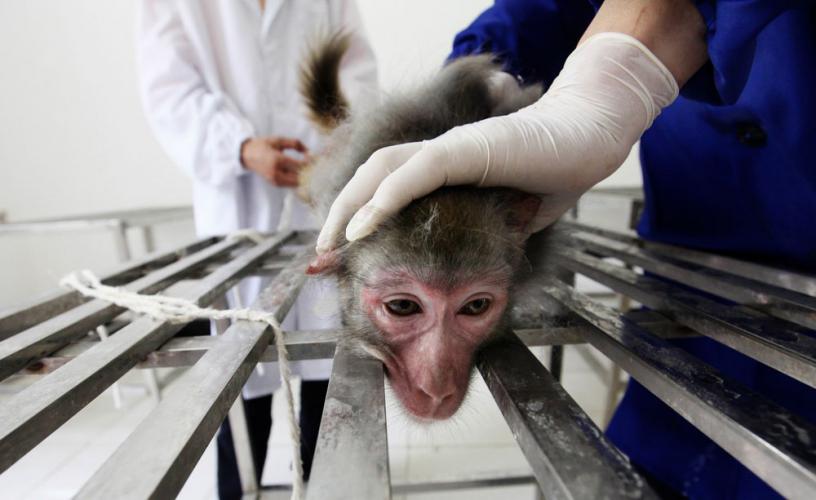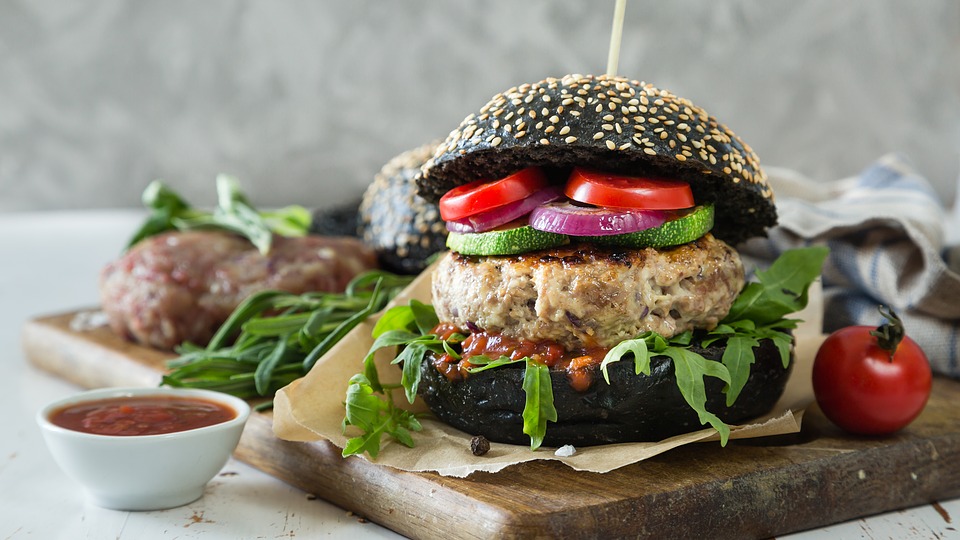Worldlog Marianne Thieme 1 mei 2018
Op 22 april was het Internationale Dag van de Aarde. Op die dag staan mensen overal ter wereld stil bij al het mooie van de aarde. Zo’n dag laat goed zien dat de problemen rondom natuur, milieu en klimaatverandering grensoverstijgend zijn en dat we samen moeten werken om ze aan te pakken. Dat besef zie ik steeds meer groeien, waar ik ook naartoe ga. Onlangs was ik in Zweden en Duitsland om daar een lezing te geven. In Zweden was ik op uitnodiging van onze zusterpartij Djurens parti en in Duitsland op uitnodiging van een theologische universiteit. Bij de lezing in Duitsland waren bezoekers uit onder andere Georgië, Hongarije, Tsjechië en Ghana. Het is prachtig om te zien dat er steeds meer mensen van verschillende achtergronden zijn die vragen om een ander soort politiek: politiek gericht op duurzaamheid en compassie in plaats van economische groei.

Marianne tijdens lezing in Zweden
Samen staan we sterk: dat laat ook de strijd tegen stierenvechten zien. Dankzij een internationale campagne aangestuurd door CAS International, besloot het Europees Parlement in 2015 dat de Europese Unie moest stoppen met subsidies aan stierenvechten. Al in 2013 nam ook de Nederlandse Tweede Kamer onze motie aan om die subsidies te stoppen. De Europese Commissie negeerde echter jaren de wens van het Europees Parlement. Maar het EU-subsidiebeleid wordt momenteel herzien, waardoor er weer kans is dat de Europese Commissie besluit nu echt geen geld meer te investeren in de stierenvechtindustrie Op 4 april protesteerde CAS International tegenover de Tweede Kamer in Den Haag tegen de huidige Europese subsidies en onze Europarlementariër Anja Hazekamp was bij dit protest aanwezig, samen met ons Tweede Kamerlid Femke Merel Arissen. Ook jij als burger kan helpen Europese beleidsmakers onder druk te zetten: teken hier de petitie tegen de Europese subsidies die naar het stierenvechten gaan!

Femke Merel en Anja Hazekamp van de Partij voor de Dieren bij het protest tegen subsidies voor stierenvechten
Op 24 april was het Wereldproefdierendag. Wereldwijd wordt het aantal dieren dat jaarlijks gebruikt wordt in dierproeven geschat op 115 miljoen, waarvan 12 miljoen dieren in Europa. Nederland heeft zelfs het grootste apentestcentrum van Europa, het BPRC. Daar worden 1500 apen gebruikt in gruwelijke experimenten. Apen krijgen elektroden in hun hoofdjes geplaatst en anderen worden ziek gemaakt met afschuwelijke ziekten. Wij hebben aandacht gevraagd voor het lot van die apen, maar ook voor miljoenen andere dieren die over de hele wereld zinloos als proefdieren worden gebruikt. De regering heeft al eerder gezegd dat Nederland tegen 2025 koploper moet zijn in onderzoek zonder dierproeven. Dan is het natuurlijk niet uit te leggen dat er nog een instelling als BPRC open is.
Zeker in deze tijd van snelle innovaties en technologische ontwikkelingen zijn er voldoende alternatieven voor dierproeven, maar onze overheden weigeren daar voldoende geld in te investeren. Wij blijven de regering en de EU onder druk zetten om een einde te maken aan de wreedheden van de dierproevenindustrie!

Experimenten op apen
Bijna de helft van alle granen en plantaardige eiwitten die in de wereld worden verbouwd, wordt aan landbouwdieren gegeven. Wat een verspilling van landbouwgrond, water en voedsel dat mensen rechtstreeks zouden kunnen eten! Onze enorme vleesconsumptie is dus decadent. Dat dringt nu door tot zelfs de meest mainstream instanties en bedrijven. Het gezaghebbende instituut de Wereld Voedselorganisatie luidde eerder al de noodklok omdat de vee-industrie een enorme bedreiging vormt voor onze voedselzekerheid, natuur en milieu. Deze maand kwam ook de Raad voor de Leefomgeving en Infrastructuur (een belangrijk adviesraad van de Nederlandse regering) met een dringend advies: de veestapel moet fors inkrimpen om de klimaatdoelen van Parijs te halen en ook consumenten moeten een bijdrage leveren door minder vlees en zuivel te eten.

Vegan burger
De Nederlandse regering steekt ondanks dit wetenschappelijke advies van de eigen adviesraad wéér haar kop in het zand en legt het advies naast zich neer. De regering heeft er met intensieve lobby deze maand zelfs voor gezorgd dat het Nederlandse kalfsvlees weer naar China mag worden geëxporteerd. Een van de meest klimaat-, milieu- en dieronvriendelijke maatregelen die een regering kan nemen. Gelukkig zien we dat anderen wél durven bij te dragen aan een positieve verandering voor mens, dier en milieu. Steeds meer bedrijven en onderwijsinstelling richten zich op lokale, biologische en plantaardige producten. Lees hier het artikel van The Guardian over hoe het veganisme steeds meer mainstream wordt.
Tot de volgende keer!
Marianne
The 22nd of April was International Earth Day. On that day, people all over the world reflect on all the beauty of the earth. Such a day demonstrates well that the problems surrounding nature, environment and climate change are transboundary and that we should collaborate to tackle these problems. I see that such awareness is growing, wherever I go. Just recently, I was in Sweden and Germany to give lectures. I was invited to Sweden by our sister party Djurens parti and to Germany by a theological university. The lecture in Germany was attended by visitors from Georgia, Hungary, the Czech Republic and Ghana among others. It’s wonderful to see that increasingly more people from different backgrounds are demanding a different kind of politics: politics focussed on sustainability and compassion instead of economic growth.

Marianne during her lecture in Sweden
Together we are in strong position: This is also demonstrated by the fight against bullfighting. Thanks to an international campaign conducted by CAS International, the European Parliament decided in 2015 that the European Union must stop its subsidies for bullfighting. The Dutch Lower House already accepted our motion to stop those subsidies in 2013. The European Commission has, however, ignored the wish of the European Parliament for years. But the EU subsidy policy is currently being reviewed, so there’s a chance again that the European Commission will decide not to invest any more money in the bullfighting industry. On the 4th of April, CAS International protested against the current European subsidies, opposite the Lower House, and our MEP Anja Hazekamp attended this protest, together with our member of the Lower House, Femke Merel Arissen. You, as a citizen, can also help to pressure European policy makers: sign the petition against the European subsidies for bullfighting here !

Femke Merel and Anja Hazekamp of the Party for the Animals at the protest against subsidies for bullfighting
The 24th of April was World Lab Animals Day. Worldwide, the number of animals that are used in animal testing is estimated at 115 million every year, of which 12 million animals are used in Europe. The Netherlands even has the largest Primate Testing Lab of Europe, the BPRC. 1500 monkeys are used there in gruesome experiments. Some monkeys get electrodes placed in their heads while others are made ill with the most horrifying diseases. We have drawn attention to what’s happening to those monkeys but also to the millions of other animals that are pointlessly used as testing animals all over the world. The Dutch government has said before that the Netherlands must be frontrunner in research without animal testing. So, it’s odd that an institute such as BPRC is still open.
Certainly, in these times of quick innovations and technological developments, there are sufficient alternatives for animal testing, but our governments refuse to invest enough money into them. We keep pressuring the government and the EU to stop the cruelties in the animal testing industry!

Experiments on monkeys
Almost half of all grains and vegetable proteins that are grown all over the world are fed to farming animals. What a waste of farming land, water and food that humans could eat directly. Our huge meat consumption is decadent. Even the most mainstream institutes and companies are now aware of this. The authoritative institute the World Food Organisation already sounded the alarm bell because the livestock industry poses a threat to our food security, nature and the environment. This month, the Council for the Living Environment and Infrastructure (an important advisory council of the Dutch government) adopted an urgent advice: the livestock industry must be considerably decreased to be able to achieve the Paris climate objectives and consumers must make their contributions too by consuming less meat and dairy products.

Vegan burger
But despite this scientific advice of its own advisory council, the Dutch government is hiding its head in the sand again and is ignoring the advice. The government’s intense lobbying this month even achieved that Dutch veal meat can be exported to China again. One of the most climate-, environmentally and animal-unfriendly measures a government can take. But fortunately, we see that others do dare to contribute to a positive change for humankind, animals and the environment. Increasingly more companies and educational institutes aim at local, organic and vegetable products. Read here the article of The Guardian about how veganism is becoming more mainstream.
Until the next time!
Marianne